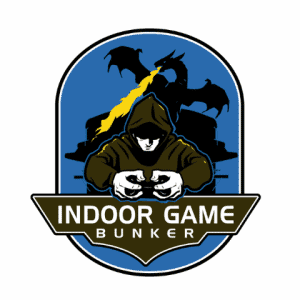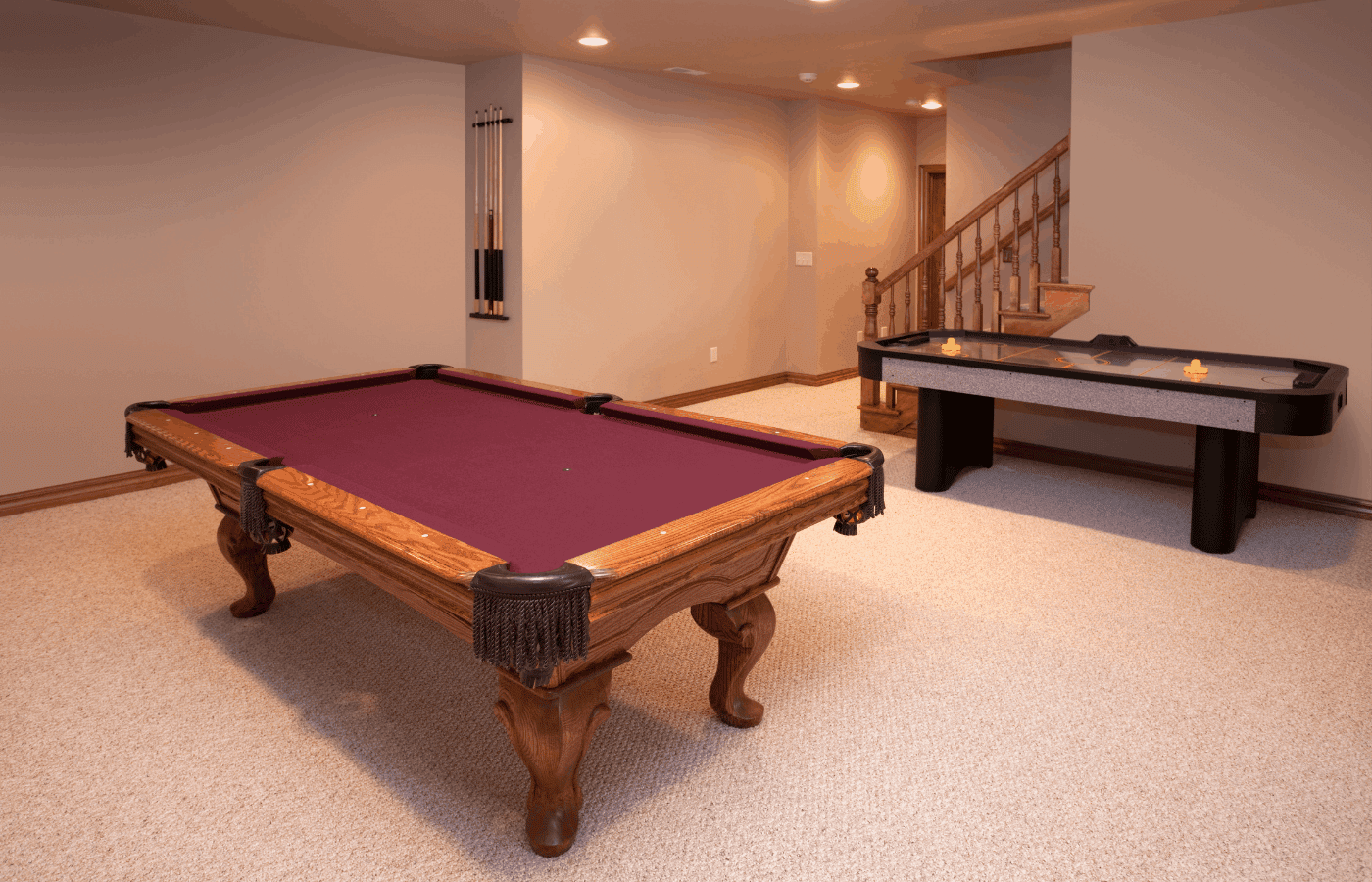The size of your basement will determine how big of a pool table you can handle. In 2019, the average United States home size was 2,301 square feet. Many homeowners do not have a full-sized basement; but, most certainly, a home that size would have a basement that can accommodate a pool table. The average pool table for home use is 7 feet long.
In order to determine the best size for your exact space, determine not only your available square footage but the amount of room you’ll have to move around once the pool table is in place. You have to be able to maneuver your way around the table and properly use cue sticks which can range from 48-58 inches in length.
If you purchase a pool table without considering the amount of room you’ll need to walk around the table, bend over it with your pool cue, and make your shots, you may very well end up with an unusable pool table in your basement.
If you have plenty of room and the funds available, there’s nothing wrong with purchasing a 9-foot table for your home basement.
Will a Pool Table Fit In My Basement?
It’s impossible to answer whether or not a pool table will fit in your basement without knowing the actual measurements of your basement or the table. Further, though it varies, an average of 5 feet of space available on each side of the pool table is recommended for good playing.
The best thing to do is grab some masking tape and outline a pool table-sized shape in the location where you are thinking of putting your new pool table in the basement. Then, perhaps with the help of a broom handle, walk around the outside of the masking tape.
Are you able to move freely around the area that you’ve marked?
Move the broom handle as you would a pool stick. Do you hit any of the walls around the table? Do you run into any problems with support beams in the basement or other furniture?
Remember to measure the broom handle and keep that in mind when looking at pool cue sticks.
What Is a Good Size for a Pool Table?
Professionally sized pool tables are typically 8 feet long and 4 feet wide. Common bar pool tables average 7 feet long. The larger the pool table, typically but not always, the better the playing experience. However, what to consider when buying a pool table will vary per person.
Things you should consider before purchasing a pool table for your personal use include:
- The average height of your players (adults or children)
- Budget
- Frequency of use
- Durability
- Skill Level
The durability and quality of a pool table will impact its overall cost. Do you want something ornate that will be the main focus of the room? Or do you want something simple that can be packed away eventually?
These are just some of the things to consider when picking out a pool table for your basement. Will you be playing often? Will you be playing alone or with multiple other people on a regular basis? How good are you? Can you tell the difference in the way your ball moves based on the quality of the felt on the table?
If your intent is to play only occasionally and alone then a smaller and less expensive pool table would be more than suitable for a basement.
To check the current price and availability of 7-foot pool tables, click here to view the selection on Amazon.
How Big Are the Pool Tables You Are Used to Playing On?
What’s your experience with playing pool? If you typically play pool at a bar, then it’s likely that you’ve become accustomed to playing on a 7-foot pool table. Most bars, utilize 7-foot pool tables to conserve space and to allow for more players and tables.
If that’s the case, then a 7-foot pool table for your basement would make sense and would be plenty big enough because you’re accustomed to it already.
If, however, you’re interested in challenging yourself then a 9-foot pool table may be your best choice. Obviously, a 9-foot pool table is larger and thus will require more effort in hitting the cue ball towards its goal.
Having a pool table in your basement can be a great way to spend your free time without having to leave the house. However, getting the right pool table to play on can make or break how much fun you’ll be able to have.
Other Considerations
Once the size of the pool table has been finalized, it’s time to start the shopping process and consider what other items are important to you. Felt quality can affect how your ball rolls. Ball pockets can crack over time so having a soft rubber pocket or a net can be something to consider as well.
It’s also important to consider the flooring. A game of pool needs to be played on a level surface. While some tables have adjustments built into the legs for leveling them, having a level floor is the best starting point.
Remember, when considering buying a pool table to put in your basement, you do not just need to consider the size of the table. You need to consider the size of the space the table will be going into. Asking about the length of the table will not provide you with any answers or context without understanding how much space you actually have to use.
Once you’ve masked off your area and decided upon the right size table, it’s time to ask yourself if you should buy a new or used pool table.
Final Thoughts
Pool tables can be expensive. If you’ve never played pool, launching into buying a pool table is not a great idea. You should try hitting a local billiards bar instead to try out the game. However, if you’ve decided to move forward with the purchase of a pool table, it may not be a bad idea to buy a used one.
Pool tables can range in price from $1,300-$3,500. It’s certainly possible to get a custom pool table and those costs can add up significantly considering the overall size and degree of customization requested. A used table could save you a good bit of money.
Before you purchase a pool table for your basement, be certain that you’ve considered all of the above appropriately. Once you’ve mapped out the size and determined overall quality, it’s time to shop and just have fun!


